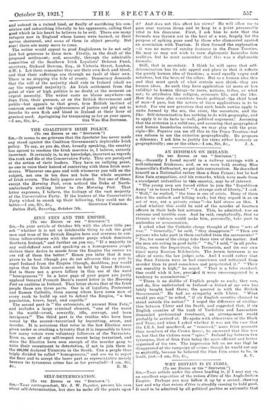AN IRISHMAN ON IRELAND.
[To THE EDITOR OF THE " SPECTATOR."] Sta,—Recently I found myself in a railway carriage with a well-informed Irishman; and, as we were both reading Miss Somerville's Enthusiast, we got into conversation. He described himself as a Nationalist rather than a Sinn Feiner; but he had Sinn Fein sympathies, and his remarks, which were made from a standpoint unfamiliar in this country, may be of interest.
" The young men are forced either to join the ' Republican Army ' or to leave Ireland." "A strange sort of liberty," I said. " Well," he replied, " the time ie one 'of crisis. Many of them detest the ambush and killing work; but they regard it as an act of war, not a private crime "—he laid stress on this. I asked whether this could be said of the murder of fourteen officers in their beds last autumn. This, ho admitted, was an extreme and terrible case. And he said, emphatically, that no threats or violence would make him, personally, take part in ambushes or assassination.
I asked what the Catholic clergy thought of these " acts of war." " Generally," he said, " they disapprove." " Then are persons who take part in them excluded from the sacraments? " " No; for some of the clergy take their view of the matter. And the men are acting in good faith." " So," I said, " in all proba- bility, were the Inquisitors, the Terrorists, and (in our own time) many Russian Bolshevists. The forum internum is no affair of ours; the law judges acts. And I would rather that the Sinu Feiners were in bad conscience and refrained from murder than in good conscience and perpetrated it." "'Their BOX morality is high," he urged. " That is a false standard. One could wish it low, provided it were unaccompanied by a tendency to assassination."
" There is no dislike of English people as such; they can, and do, live undisturbed in Ireland—a friend of my own has lately bought land there; the quarrel is with the British Government." He had no sympathy with Ulster. " What would you say," he asked, " if six English counties claimed to stand outside the nation? " I urged the difference of civiliza- tion between Ulster and the South, and suggested that, if six English counties of the rank of Yorkshire and Lancashire demanded preferential treatment, an arrangement would probably be arrived at. Ho spoke with abhorrence of the Black and Tans; and when I asked whether it was not the case that the I.R.A. had murdered, or " removed," more Irish peasants than members of the Crown farces, he answered that this was so, but that the victims were " spies." Ireland lay between two tyrannies, that of Sinn Fein being the more efficient and better organized of the two. The impression left on me was that he disapproved of the campaign of crime; though he would not say so explicitly, because he believed the Sinn Fein cause to be, in






































 Previous page
Previous page